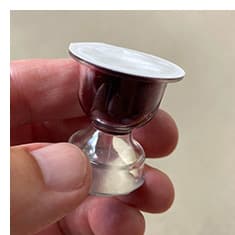By Kent E. Fillinger
Prefilled/prepackaged cups used for celebrating the Lord’s Supper have been around since the 1990s, but their sales soared when COVID-19 spread around the world in early 2020. We wondered about their use in Christian churches and churches of Christ now that fear of the virus has eased.

Our Aug. 1-5 survey about weekly Communion practices received 141 responses from people who worship in churches of all sizes.
A little more than half of the respondents (54 percent) reported their church uses the prepackaged Communion cups (with juice and bread sealed in a single container, purchased from a vendor . . . sometimes referred to as “rip and sips”). All the megachurches (averaging 2,000 or more in weekly worship attendance) reported using these prepackaged cups, and 71 percent of medium churches (averaging 250 to 499) and large churches (500–999) reported the same. Very small churches (fewer than 100 in attendance) were the least likely to use the prepackaged cups (37 percent).
Almost one-fourth of survey respondents (24 percent) reported their church uses bread trays and juice trays (with individual cups) prepared onsite; 9 percent said their church uses both the prepackaged cups as well as the individual bread and juice trays and cups; while 11 percent of respondents said their church uses “two cups stacked with the bread in the bottom cup and the juice in the top cup.”
Most churches (62 percent) reported that people pick up their prepackaged Communion cups as they enter the service or during the service, 26 percent said the emblems are passed one person to another during the service, and 4 percent said the emblems are available in the seat back or pew in front of them.
In churches using the prepackaged Communion cups, 42 percent of respondents either “strongly agreed” or “agreed” they were easy to use, while 45 percent either “disagreed” or “strongly disagreed” the prefilled cups were easy to use.
Nine in 10 respondents “strongly agreed” or “agreed” the prepackaged cups are “convenient and safe” to use. As for whether the prepackaged cups are “cost effective or economical,” 16 percent of respondents “agreed” or “strongly agreed” with that statement, while 30 percent “disagreed” or “strongly disagreed.”
In churches using the prefilled Communion cups, 7 percent of those people surveyed said they enhance or add to commemorating Jesus’ death and resurrection in the Lord’s Supper, while almost one-third (32 percent) said they detract from Communion. More than half—61 percent—said the prepackaged cups neither enhanced nor detracted from Communion.
More than one-third of respondents (34 percent) said their church will “definitely” continue to use the prepackaged cups, while 41 percent said they were “somewhat likely” to continue using them. Only 13 percent of respondents said their church is “somewhat unlikely” or “definitely unlikely” to continue using the prepackaged cups.
Kent E. Fillinger serves as president of 3:STRANDS Consulting, Indianapolis, Indiana, and regional vice president (Ohio, Pennsylvania, Michigan) with Christian Financial Resources.

0 Comments